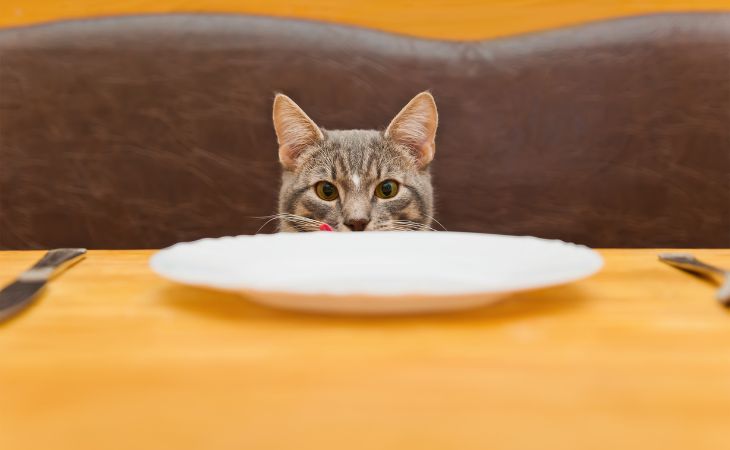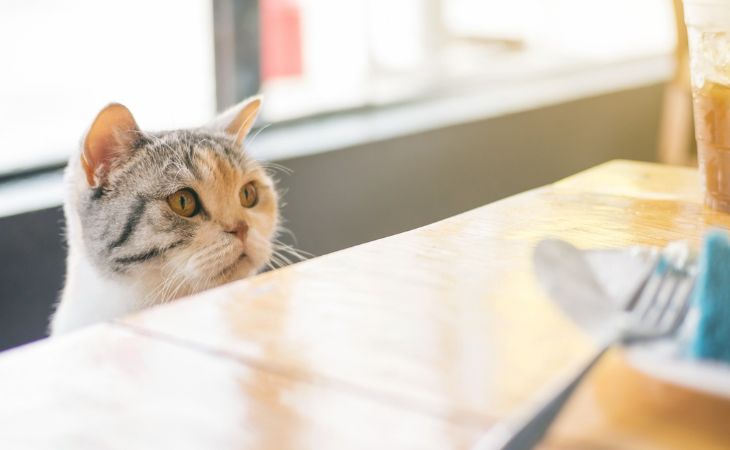It’s hard to resist the sweet eyes your cat makes when you’re at the table, or even when you’re cooking. In most cases, owners succumb to temptation. These little felines have the power to make our hearts melt us with their eyes. The problem is whether giving your cat table scraps suits their diet. Read this article to find out!
A cat’s diet
Cats are naturally carnivores. They mainly eat meat. This is because felines need to a large amount of proteins. It’s good for their muscular development and allows them to maintain strength in their muscles during their entire existence. The proteins also help your cat’s coat grow healthily. In addition, they are responsible for different metabolic processes that are produced in their body.
However, proteins are not the only nutrients that cats need. They also need fatty acids, thiamine, taurine and some vitamins (A, D…) that their bodies are unable to produce. To do this, they often eat insects, fish, little birds, rodents. However, cats can also eat plant-based foods from time to time. With that being said, this only represents 10% of their diet against 90% for the animal meat.
Dry food and wet food are largely enough to fulfill a cat’s nutritional needs. Cats don’t have receptors in their mouths that allow them to appreciate the taste of food like humans do. Certainly, they have a very developed sense of smell, but they will not be sad if you always serve them the same food. However, you can give your cat a few treats that are designed to please cats.
It can be sticks or even pastes to lick. Cats love them! These treats can even help instill good habits. For example, teaching them how to use their litter box. Again, you need to be careful about the treats you give your cat.
This Letsgetpet article might interest you: How to deal with a finicky cat
Giving table scraps to your cat: is it a good idea?
As cats find all that they need for their diet in dry food and wet food, it is better to stick to these for their food. By giving them table scraps, you risk putting their well-being in danger. Humans are omnivores and eat everything. In addition, since we have certain gustatory senses, we attach great importance to the taste of what we eat.
It’s even one of the main criteria of appreciating our meals. Therefore, to cook it, we use different spices and condiments depending on the dish. For example, we use salt, sugar, and spices. However, these condiments can affect your cat’s health and can cause digestive issues like vomiting and diarrhea. You need to know that cats have a digestive system that cannot handle sudden changes, which is not the case of humans.
We like to vary what we eat and several possibilities are offered to us as we are omnivores. Therefore, it is best to avoid getting your pet used to eating table scraps for their well-being. Another risk that you run by doing this is instilling bad habits in your cat.
By giving them your leftovers, your cat will want to bother you every time that you want to eat. They will put themselves around you as soon as you serve yourself some food. They can even try to serve themselves directly from your plate when you turn away. Your cat can also steal food when you’re away or become obese from eating a lot.
This Letsgetpet article might interest you: Why is my cat always asking for food?

Table scraps you should not give your cat
Among the foods that humans eat, there are a few with serious consequences on the health of cats. Giving your cat table scraps is, therefore, not advised.
Foods containing chocolate
In no case should you ever leave your cat to eat foods that contain chocolate. These are usually cocoa-based, and contain theobromine. Theobromine is a caffeine-like substance that is toxic to cats. It acts as a cardiac stimulant. Your cat may pass away within 24 hours of consuming 50 g of chocolate.
While felines are not particularly attracted to this food, you have to be careful that your cat does not get close to it. They can develop symptoms like diarrhea, vomiting, muscle tremors, cramps, and convulsions. Even small amounts of chocolate can disrupt your cat’s nervous system and increase their heart rate. If your cat has ingested chocolate without your knowledge, you should take them to the vet immediately.
Avocado, a food to avoid giving your cat
You should avoid giving avocado to your cat. This food contains persin. It is a fungicidal toxin that can act on the metabolism of your cat. It prevents their body from absorbing proteins from the food they eat.
As a result, your cat will be deficient in these nutrients, which are so important for their well-being. In addition, persin can damage your cat’s cardiac system, causing shortness of breath, and respiratory problems. So it’s imperative that you avoid giving your cat avocado at the table.
Raw apples and potatoes
Raw potatoes and their skin are rich in calcium oxalate. It is a substance that can disturb the proper functioning of your cat’s urinary system. This dysfunction of the urinary tract promotes the formation of crystals in various organs of your cat, such as the kidneys, urinary tract or bladder.
This causes kidney stones in cats. Raw potatoes also contain solanine, which is a toxin for cats. This substance can cause nervous and digestive disorders in your cat, and even death if present in large quantities.
Milk
Most people think that milk is part of the good foods to give cats. Unfortunately, cats like to drink it as well. However, milk is not recommended for a cat’s diet. Most cats do not have the enzyme necessary to digest lactose contained in this drink. Their consumption can, therefore, cause indigestion, vomiting, diarrhea. Some cats can even develop allergic reactions after eating it.
Onions, chives, and garlic: do not give these table scraps to your cat!
These foods are often in the preparation of several dishes consumed by humans. However, it presents a real danger for your cat. Onions, garlic, and chives contains several toxins, particularly thiosulfate. These substances act on red blood cells and can cause anemia in your pet.
Symptoms generally appear between the first and third day after ingesting one of these foods. They may include increased heart rate, generalized weakness, vomiting, loss of appetite or fever.
This list of table scraps to not give your cat is not exhaustive. There are still other foods like coffee, tea, alcohol, grapes, and nuts that should be avoided. Because of this, it’s best not to give your cat table scraps.
This Letsgetpet article might also interest you: Top 26 dangerous foods for cats

